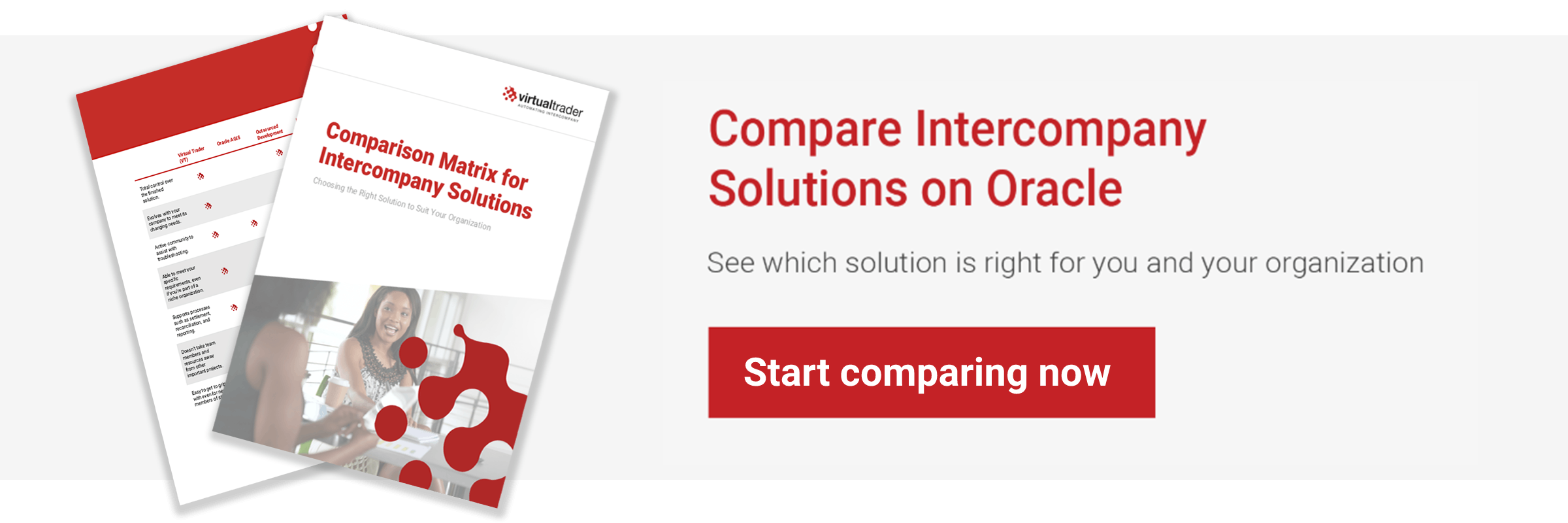Virtual Trader is a module that sits within Oracle EBS, providing organizations with an automated system that manages intercompany transactions. It isn’t the only solution available to your business, and many companies have all the functionality they need in the Oracle AGIS module. So what does Virtual Trader offer that other solutions don’t?
Use Virtual Trader for Intercompany Transactions
First let's consider Oracle AGIS. It’s come a long way since the manual processes that used to be plagued by human error and problems. It allows your business to create and manage intercompany cross charges from a centralized location.
There are, however, ways to improve on AGIS functionalities. Software that is external to the Oracle solution can provide advanced settlement options and identify reconciliation issues before they occur. Virtual Trader is an example of such software.
Deciding on the most appropriate intercompany solution for your business isn’t a quick choice, however. It’s important to consider each available option and gather as much information as possible about the respective benefits.
Breadth of Scope
Oracle AGIS is just one of a number of point solutions that are designated for intercompany requirements. Each solution has its own functionality and method of operation that’s based on the module it belongs to. These features cover basic intercompany needs, which is sufficient for some companies.
Many organizations have everything they need with these solutions and don’t need to worry about the next step. Evolving organizations, however, that use modern business practices for manufacturing, distribution, and tax planning need something a little more flexible.
For example, when businesses grow, expand their global reach, or absorb subsidiaries, their intercompany requirements dramatically increase. This leads to them needing an automated system. This is where Virtual Trader comes in; it helps organizations to reach the highest growth targets — evolving alongside them.
Virtual Trader has developed into a comprehensive and consistent solution for automating intercompany. It’s able to automate intercompany transactions that deal with intangible goods and services, such as warranties and intellectual property.
A key advantage of Virtual Trader over other solutions is its flexibility and adaptive nature. It’s able to suit a variety of needs because it’s deployed through business rules rather than being embedded in the software.
Integration with Remote Applications
Organizations often use multiple systems that produce data in different formats. This can result in problems when creating, managing, and settling intercompany activities because organizations will need to convert and process data before it can be accepted by their system. And the larger the organization, the more likely this scenario is.
Trying to coordinate between different systems can slow the reconciliation process and lead to miscommunication and error. Since intercompany is the last action before period close, any reconciliation errors and issues often lead to the close being late.
It isn’t just non-Oracle EBS systems that can cause issues. Even if other entities are using Oracle, they might have a slightly different version or be using a conflicting combination of modules. This can create the same problem of data needing to be converted and processed because it’s in a different format.
Virtual Trader has been designed from the outset so that it can accept data from any external system. It can also send outbound transactions to remote applications in the required format for direct import by the receiving system.
Seamlessly integrating with remote applications eliminates the previously complicated conversion process and ensures intercompany reconciliation is timely and efficient.
Virtual Trader Has Aging Analysis
Oracle AGIS is a fantastic mechanism for raising intercompany transactions. After being created as journals, these will be posted directly into Oracle General Ledger. Unfortunately, AGIS is unable to update liabilities, so you’re unaware which are still open and how old they are.
Since organizations rarely settle payments in full in one sitting, there can be serious tax implications if there’s a lack of aging analysis. You would be unable to keep an accurate track of how old liabilities are.
Virtual Trader has a dedicated Intercompany Subledger that keeps track of intercompany receivable and payable transactions before sending them to the General Ledger. Settlement activity is automated with journals being created and sent to the appropriate General Ledger.
All settled items are closed in the Subledger, which then provides aging analysis on all open items. It provides intercompany balance reporting and Virtual Trader–to–General Ledger intercompany balance reconciliation.
Managing of Ad Hoc Tasks
Virtual Trader can be used for any volume of business activity without experiencing problems with functionality. When it comes to ad hoc tasks, Virtual Trader can:
-
Create intercompany invoices.
-
Link to tax facilities for the evaluation of transactional tax (such as VAT), and such transactions aren’t automatically included in any returns that are made.
-
Automate processes for Trade Through intermediaries where a company may sell to one before they then sell to another.
Easily Change or Reorganize a Business with Virtual Trader
Businesses are constantly growing, changing, and evolving. It’s common for complete restructures to take place when new entities are acquired or assimilated. Sudden changes to the company structure can cause significant problems for intercompany transactions.
With Virtual Trader, you don’t need to worry about these changes. Rather than being based on business relationships, Virtual Trader deploys business roles to manage trading methods. By dynamically assigning relationships, Virtual Trader ensures that company changes and setups are completed quickly and easily.
Streamline Your Intercompany Transactions with Virtual Trader
Virtual Trader has been specifically designed to make your life easier. The reconciliation process is automated, reducing human error and mistakes that can lead to serious problems. To find out more about the benefits of Virtual Trader and the other options available to you when evaluating intercompany solutions, download our free comparison guide.




 US
+1 800 961 9640
US
+1 800 961 9640

